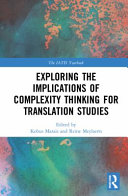

Most ebook files are in PDF format, so you can easily read them using various software such as Foxit Reader or directly on the Google Chrome browser.
Some ebook files are released by publishers in other formats such as .awz, .mobi, .epub, .fb2, etc. You may need to install specific software to read these formats on mobile/PC, such as Calibre.
Please read the tutorial at this link: https://ebookbell.com/faq
We offer FREE conversion to the popular formats you request; however, this may take some time. Therefore, right after payment, please email us, and we will try to provide the service as quickly as possible.
For some exceptional file formats or broken links (if any), please refrain from opening any disputes. Instead, email us first, and we will try to assist within a maximum of 6 hours.
EbookBell Team

4.4
92 reviewsIn this volume, the contributors address a variety of implications that this new approach holds for key concepts in Translation Studies such as source vs. target texts, translational units, authorship, translatorship, for research topics including translation data, machine translation, communities of practice, and for research methods such as constraints and the emergence of trajectories. The various chapters provide valuable information as to how research methods informed by complexity thinking can be applied in translation studies.
Presenting theoretical and methodological contributions as well as case studies, this volume is of interest to advanced students, academics, and researchers in translation and interpreting studies, literary studies, and related areas.